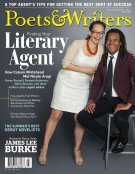Claire Armitstead, literary editor of the Guardian, is spearheading a new collaboration between the London-based newspaper and British independent publisher Legend Press that champions self-published fiction writers in the United Kingdom. This past April, authors residing in England, Northern Ireland, Scotland, and Wales began submitting their novels to the Guardian Legend Self-Published Book of the Month competition. Each month, twenty staff readers at Legend are tasked with narrowing down an average of five hundred submissions to a shortlist of ten; a panel of experts—including authors Polly Courtney and Stuart Evans, literary agent Andrew Lownie, and Legend’s commissioning editor Lauren Parsons—then chooses the winner of the contest, whose book is reviewed in the Guardian. The first winner was Tom Moran for his comedic novel Dinosaurs and Prime Numbers, which was reviewed in June. Armitstead describes the award as an attempt to keep up with the surging interest in self-publishing and to give high-quality work a valuable platform.
What made you decide to launch this award?
I’ve been aware for a while that this huge area is completely uncharted by the media. The Guardian has dipped a toe in the water—we ran a [weekly series called] Self-Publishing Showcase for a few months—but the problem is finding the good stuff. Legend already does quite a bit with self-publishing, so my community coordinator at the time said, “Why don’t we team up with them to create a competition? We’ll pick one novel a month.” One a month is [not much], but at least it is one a month and we have a system in place to find a good self-published novel. You can find a lot of bad ones, and end up saying, “This is a rubbish sector.” We know that’s not true because of the sheer volume of [self-published writing], but it’s a question of what sorting mechanism you develop to find what’s good—and nobody’s cracked it yet, to my knowledge.
What does it take for a self-published book to be a winner?
I got into trouble in the original article [announcing the award] for saying that self-publishing seems like “a wilderness of elves” and erotica. As far as I’m concerned, if it’s a good book it’s a good book. But having said that, however successful Fifty Shades of Grey has been, that’s not what we’re looking for, because we’re looking for something within the scope of our journalism. One self-published book that I would dearly love to have discovered is Sergio de la Pava’s A Naked Singularity. There is a book of real world class! I’m being notified daily about books by people who have been in conventional publishing and have decided to go it alone, as well as people who are new, but I don’t have the hours or the resources to sift through them all. That’s the problem. Book publishers have always offered reviewers a sophisticated filtering system. So in the absence of those doorkeepers, how do we find a new way of making a door?
What do you think are the benefits of self-publishing?
Self-publishing is a very hard route, because you have to be the person who grooms the before-and-after publication yourself, and you have to have a huge amount of energy. But a self-published writer also doesn’t have anybody saying, “We don’t like your work because it hasn’t been done before.” She can create her own market. We’re getting to an age when everyone’s talking about brands and not about writers, and this is a way that individual writers can take power back for themselves, if they have the energy and the chutzpah to do it. Also talent. Many of the huge number of self-published books are by people whose best friends weren’t quite brave enough to [dissuade them from publishing their work]—and that’s fine. That work will sink down, and hopefully we won’t have to wade through it.
Will winners get a shot at traditional publication with Legend Press?
The Guardian will review the book, so we’ll put it on the map in that way, but there is always the possibility of a relationship with the publisher. Everybody wants to discover the good self-published work. It’s just the scale of the search that is completely daunting.
Are there any plans to extend beyond novels?
Novels are our focus at the moment. There are all sorts of directions we could expand into if it works, but the industry as a whole just seemed too huge. I wouldn’t be surprised if we get some things that are in that strange borderland between fiction and nonfiction, something we haven’t seen before. There is some very interesting cross-genre work being done.
Could you see a situation where you might not choose a winner one month?
It’s not going to do anyone any favors for us to review a bad book, but we need to be in that situation before we decide what to do about it. I don’t see why we shouldn’t find a good novel every month. We’re only asking for one. Many of my initiatives start out idealistic, and then we realize how difficult these things are. But the self-publishing community is a powerful, growing tide. If newspapers and the media don’t deal with it, we’re going to be left way behind. Some literary agents in Britain and in the United States are beginning to consider self-published work. The publishing industry is famously slow to change, so for it to be quicker than the media is a bit shaming, really. We’ve got to do something about it.
Joanna Scutts is a writer and critic in Queens, New York. She is a board member of the National Book Critics Circle and reviews nonfiction and literary fiction for several publications, including the Washington Post, the Nation, and the Wall Street Journal. Her website is joannascutts.com.








